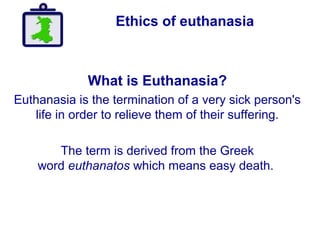
Euthanasia
- 1. Ethics of euthanasia What is Euthanasia? Euthanasia is the termination of a very sick person's life in order to relieve them of their suffering. The term is derived from the Greek word euthanatos which means easy death.
- 2. Euthanasia can be carried out either by taking actions, including giving a lethal injection, or by not doing what is necessary to keep a person alive (such as failing to keep their feeding tube going).
- 3. Euthanasia and pain relief Is it an euthanasia to give a drug in order to reduce pain, even though the drug causes the patient to die sooner?
- 4. Mercy killing Very often people call euthanasia 'mercy killing', perhaps thinking of it for someone who is terminally ill and suffering prolonged, unbearable pain.
- 5. Why people want euthanasia ? Physiological Factors Cancer Aids Paralysis Fatal accident Psychological Factors Stress Anxiety
- 6. Classification of euthanasia Active euthanasia In active euthanasia a person directly and deliberately causes the patient's death. It is intentionally hastening death by a deliberate positive act, such as giving a lethal injection.
- 7. Passive euthanasia In passive euthanasia death is brought about by an omission – For example, by withdrawing food, or withdrawing or withholding treatment in order to let the person die which would otherwise have delayed death.
- 8. Assisted suicide This is when the person who wants to die needs help to kill themselves, asks for it and receives it.
- 9. Indirect euthanasia providing treatment (usually to reduce pain) that has the expected side effect of causing the patient to die sooner.
- 10. Involuntary euthanasia This occurs when the person who dies wants to live but is killed anyway. It is usually the same thing as murder.
- 11. Non-voluntary euthanasia This is where the person is unable to ask for euthanasia (perhaps they are unconscious or otherwise unable to communicate), or to make a meaningful choice between living and dying and an appropriate person takes the decision on their behalf, perhaps in accordance with their living will, or previously expressed wishes.
- 12. Voluntary euthanasia This is where euthanasia is carried out at the request of the person who dies.
- 13. Why euthanasia should be allowed? Those in favour of euthanasia argue that a civilised society should allow people to die in dignity and without pain, and should allow others to help them do so if they cannot manage it on their own.
- 14. They say that our bodies are our own, and we should be allowed to do what we want with them. So it's wrong to make anyone live longer than they want. In fact making people go on living when they don't want to violates their personal freedom and human rights.It's immoral, they say to force people to continue living in suffering and pain.
- 15. Why euthanasia should be forbidden? Religious opponents of euthanasia believe that life is given by God, and only God should decide when to end it. Other opponents fear that if euthanasia was made legal, the laws regulating it would be abused, and people would be killed who didn't really want to die.
- 16. Overview of arguments against euthanasia Ethical arguments: Euthanasia weakens society's respect for the sacredness of life. Accepting euthanasia accepts that some lives (those of the disabled or sick) are worth less than others
- 17. Voluntary euthanasia may leads to involuntary euthanasia and the killing of people who are thought undesirable.
- 18. Buddhism and euthanasia The most common position is that voluntary euthanasia is wrong, because it demonstrates that one's mind is in a bad state and that one has allowed physical suffering to cause mental suffering.
- 19. Buddhists might also argue that helping to end someone's life is likely to put the helper into a bad mental state, and this too should be avoided. The intentional ending of life is against Buddhist teaching and voluntary euthanasia should be forbidden. Certain codes of Buddhist monastic law explicitly forbid it.
- 20. In Buddhism, the way life ends has a profound impact on the way the new life will begin. So a person's state of mind at the time of death is important - their thoughts should be selfless and enlightened, free of anger, hate or fear.
Hinweis der Redaktion
- n
